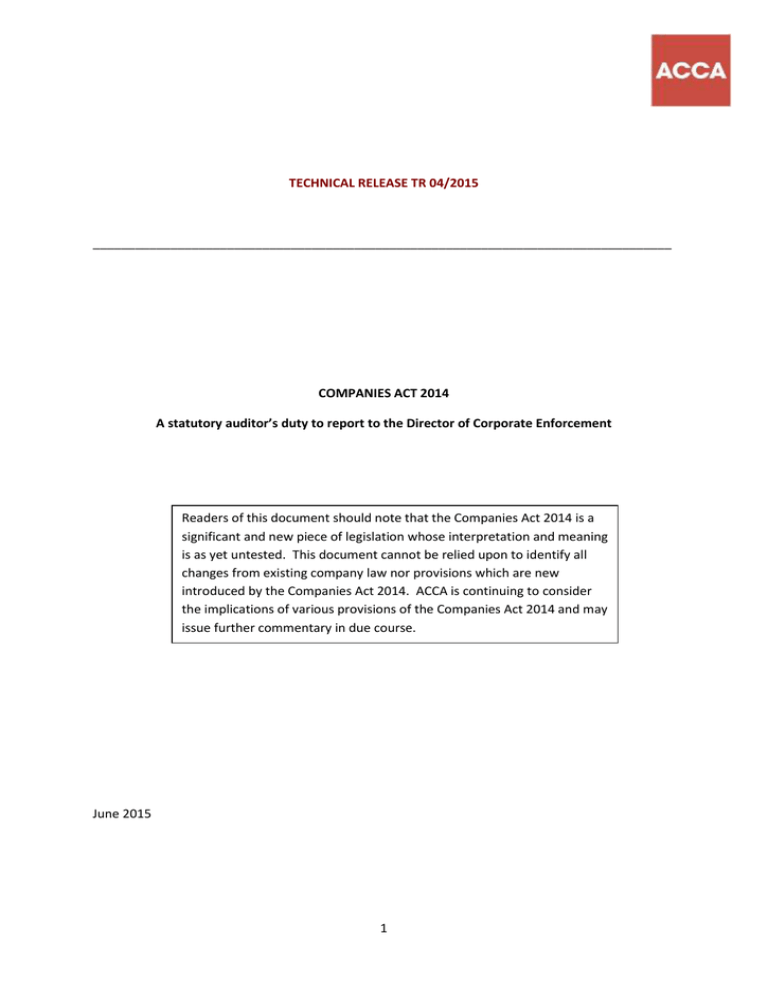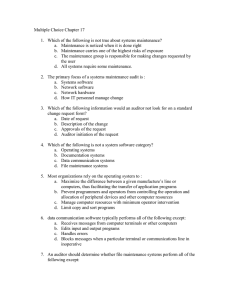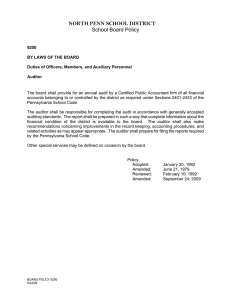
TECHNICAL RELEASE TR 04/2015
__________________________________________________________________________________
COMPANIES ACT 2014
A statutory auditor’s duty to report to the Director of Corporate Enforcement
Readers of this document should note that the Companies Act 2014 is a
significant and new piece of legislation whose interpretation and meaning
is as yet untested. This document cannot be relied upon to identify all
changes from existing company law nor provisions which are new
introduced by the Companies Act 2014. ACCA is continuing to consider
the implications of various provisions of the Companies Act 2014 and may
issue further commentary in due course.
June 2015
1
Disclaimer
This document is for information purposes only and does not give, or purport to give, professional
advice. It should, accordingly, not be relied upon as such. No party should act or refrain from acting
on the basis of any material contained in this document without seeking appropriate professional
advice. ACCA does not guarantee the accuracy or veracity of any information or opinion, or the
appropriateness, suitability or applicability of any practice or procedure contained in this document.
To the fullest extent permitted by applicable law, ACCA shall not therefore be liable for any damage
or loss, including but not limited to, indirect or consequential loss or damage, loss of data, income,
profit or opportunity and claims of third parties, whether arising from the negligence, or otherwise
of ACCA, its employees, servants or agents, or of the authors who contributed to the text.
Similarly, to the fullest extent permitted by applicable law, ACCA shall not be liable for damage or
loss occasioned by actions, or failure to act, by any third party, in reliance upon the terms of this
document, which result in losses incurred either by ACCA members, those for whom they act as
agents, those who rely upon them for advice, or any third party. ACCA shall not be liable for damage
or loss occasioned as a result of any inaccurate, mistaken or negligent misstatement contained in
this document.
All rights reserved. No part of this publication will be reproduced, stored in a retrieval system, or
transmitted in any form or by any means, electronic, mechanical, photocopying, recording or
otherwise, without the prior written permission of the copyright holder.
Any issues arising out of the above will be governed by and construed in accordance with the laws of
the Republic of Ireland and the courts of the Republic of Ireland shall have exclusive jurisdiction to
deal with all such issues.
© Copyright Consultative Committee of Accountancy Bodies - Ireland
2
Table of Contents
Section
Subject
Pages
1
Introduction
4
2
Duty to report
4
3
Category 1 and Category 2 offences
5
4
Changes in reportable offences
5-8
3
1.
INTRODUCTION
The Companies Act 2014 (‘CA 2014’) was signed into law on 23 December 2014. The vast majority of
the provisions of CA 2014 are to commence on 1 June 2015. With limited exceptions, the
accounting and auditing related provisions commence for financial statements approved on or after
1 June 20151.
This Technical Release addresses the obligation on a statutory auditor to report to the Director of
Corporate Enforcement (‘ODCE’) in accordance with sections 392 and 393. The intention of this
Technical Release is to highlight changes to these reporting obligations vis-à-vis the existing
requirements under previous Companies Acts.
This Technical Release is intended to assist members in familiarising themselves with some of the
key changes in CA 2014 and not to be an in-depth analysis of the relevant provisions of CA 2014.
References to ‘section(s)’ are references to the relevant sections of CA 2014, unless otherwise
indicated.
2.
DUTY TO REPORT
Section 393(1) sets out the duty as follows:
“Where, in the course of, and by virtue of, their carrying out an audit of the financial
statements of the company, information comes into the possession of the statutory auditors
of a company that leads them to form the opinion that there are reasonable grounds for
believing that the company or an officer or agent of it has committed a category 1 or 2
offence, the statutory auditors shall, forthwith after having formed it, notify that opinion to
the Director and provide the Director with particulars of the grounds on which they have
formed that opinion.”
This duty has not changed substantially from what was previously addressed by section 194(5) of the
Companies Act 1990 (as amended). The methodology and approach contained in APB Bulletin
2007/2 “The Duty of Auditors in the Republic of Ireland to Report to the Director of Corporate
Enforcement” continue to apply when deciding if a report to the ODCE is required although the
company law offences and references change with the commencement of CA 2014.
The changes most likely to affect reporting by a statutory auditor to the ODCE are set out below.
1
The Companies Act 2014 (Commencement) Order 2015 (S.I. No. 169 of 2015)
4
3.
CATEGORY 1 AND CATEGORY 2 OFFENCES
Section 871(1) defines a category 1 offence as one which could give rise to either:
A summary conviction, a Class A2 fine or a prison term not exceeding 12 months or both; or
A conviction on indictment, a fine not exceeding €500,000 or a prison term not exceeding 10
years or both.
Section 871(2) defines a Category 2 offence as one which could give rise to either:
A summary conviction, a Class A2 fine or a prison term not exceeding 12 months or both; or
A conviction on indictment, a fine not exceeding €50,000 or a prison term not exceeding 5
years or both.
While the terminology has changed, the obligation on a statutory auditor to report to the ODCE
continues to relate to offences that can be tried on indictment.
4.
CHANGES IN REPORTABLE OFFENCES
CA 2014 has introduced a number of newly reportable offences and has also changed some
previously reportable offences. In particular a statutory auditor should have regard to the following:
New Offences
4.1 True and Fair View
Section 324(6) provides that every director of a company who is party to the approval of statutory
financial statements that do not give a true and fair view or otherwise comply with the requirements
of CA 20143 knowing that the financial statements do not give such a view or otherwise so comply or
is reckless as to whether this is so is guilty of a category 2 offence.
A statutory auditor will consider the reporting obligation to the ODCE where the opinion in the
statutory audit report is qualified with regard to:
the truth and fairness of the entity or group financial statements of a company;
the compliance of the financial statements with the requirements of CA 20143;
in light of the provisions of section 324(6).
There are various types of qualification of the statutory auditor’s report possible in accordance with
CA 2014 and International Standards on Auditing (UK and Ireland). A qualification may not
automatically give rise to a reporting obligation to the ODCE in all cases; it will be necessary for the
statutory auditor to give due consideration to the facts and circumstances involved. ACCA is
2
3
The Fines Act 2010 sets a Class A fine as a fine not exceeding €5000 but exceeding €4000
Or, where applicable, with the requirements of Article 4 of the IAS Regulation
5
continuing to consider the implications of this new reportable offence with respect to the statutory
auditor’s duty to report to the ODCE and may issue further guidance in due course.
4.2 Directors’ Report - Relevant Audit Information
Section 3304 requires directors to state in their Directors’ Report that, as far as each director is
aware, there is no relevant audit information of which the statutory auditor is unaware and that
each director has taken all the steps necessary to be aware of and establish that the statutory
auditor is aware of relevant audit information. Any director who knew that such statement was
false or was reckless as to whether it was false and who failed to take reasonable steps to prevent
the approval of the Directors’ Report shall be guilty of a category 2 offence.
A statutory auditor should be aware of this requirement when considering the Directors’ Report in
the course of the audit and consider any obligation to report to the ODCE if necessary.
4.3 Signature of Balance Sheet
Section 324 requires a director/directors of a company to sign the original balance sheet and the
signatory/ies’ name/s to be shown on each copy of that balance sheet to be laid before the
members of the company or otherwise circulated or published or delivered to the Registrar of
Companies. If these requirements are not complied with, the company and any officer of it in
default shall be guilty of a category 2 offence.
A statutory auditor will consider the reporting responsibility to the ODCE in the event of becoming
aware that such signature/s or signatory’s/ies’ name/s are absent from the specified documents.
4.4 Abridged Financial Statements
Section 355(7) provides that every director of a company who is party to the approval of abridged
financial statements which have not been prepared in accordance with CA 2014 and who knows that
they have not been so prepared or is reckless to as to whether they have been so prepared shall be
guilty of a category 2 offence. Additionally sections 355(9) and 356(5) provide that the company and
any of its officers who are in default due to non-compliance with the requirements of CA 2014 as
regards the documents, including the statutory auditor’s special report on the abridged financial
statements, to be annexed to the Annual Return will be guilty of a category 2 offence.
A statutory auditor will consider the reporting responsibility to the ODCE where the opinion is
formed that the abridged financial statements were prepared incorrectly or in the event of
becoming aware that the Annual Return fails to include all the necessary attachments.
4
Section 330 commences with respect to the first day of a company’s financial year beginning on or after
1 June 2015
6
Changed Offences
4.5 Adequate Accounting Records
Sections 281 to 285 set out the obligation on a company to keep adequate accounting records and
also set out the particular requirements to be met in this regard. A company that fails to keep
adequate accounting records and any director who fails to take all reasonable steps to secure the
company’s compliance with the requirements of sections 281 to 285 inclusive shall be guilty of a
category 1 or a category 2 offence, depending on the nature of the non-compliance.
A statutory auditor is required, in the statutory auditor’s report, to express an opinion on whether
the accounting records of the company were sufficient to permit the financial statements to be
readily and properly audited.
Additionally, in the course of, and by virtue of the audit, a statutory auditor may form the opinion
that the accounting records are not adequate in relation to another requirement set out by CA 2014.
A statutory auditor should be aware that companies are required to comply with all the
requirements set out in sections 282 to 285 in order to have adequate accounting records.
Requirements newly introduced by CA 2014 include:
taking adequate precautions to guard against falsification, and facilitating discovery of such
falsification if it occurs, when the accounting records are kept otherwise than in a bound
book (section 282(2));
location of a server computer in the State where that computer provides services to another
computer which are necessary for the maintenance of the accounting records of the
company in the State (section 282(6) and (7)5).
Where a statutory auditor forms the opinion that adequate accounting records are not held,
section 392 requires the statutory auditor to notify the company, by recorded delivery, of that
opinion, and, if the directors do not take steps to ensure the adequacy of the records within seven
days of that notification to the company, that the statutory auditor notifies the Registrar of
Companies in the prescribed form. A statutory auditor is not required to make this notification
where the opinion is formed that the contravention concerned is minor or otherwise immaterial in
nature.
A statutory auditor is obliged by section 393(1) to report to the ODCE, if he/she forms the opinion
that the company has not kept adequate accounting records. Such an opinion may also require the
statutory auditor’s report on the financial statements to be qualified if, in the statutory auditor’s
opinion, the accounting records did not permit the financial statements of the company to be readily
and properly audited. See section 2.4 of Technical Release TR 03/2015 ‘Companies Act 2014
Implications for a statutory auditor’s report on statutory financial statements’ for further
information on the audit opinion with regard to accounting records.
5
Where the accounting records are kept outside the State, this requirement will not apply unless Ministerial
Regulation provides otherwise
7
4.6 A Statutory Auditor’s Right to Information and Explanations
A statutory auditor’s right to information and explanations, within two days of having made the
request, from the officers of the company being audited is set out in section 387. Section 388
further requires a subsidiary entity and its statutory auditor to provide the parent company’s
statutory auditor with information and explanations requested reasonably by the parent company’s
statutory auditor for the purposes of that parent company’s statutory audit within five days. Any
officer of a company or subsidiary undertaking or statutory auditor not complying with these
provisions is guilty of a category 2 offence.
Should a statutory auditor experience difficulty in obtaining information from the officers of a
company or from its subsidiary company or that company’s statutory auditor, consideration is given
to the reporting requirement to the ODCE.
Additionally, section 389 provides that an officer of a company who knowingly makes a false or
misleading statement to the statutory auditor or makes a statement reckless as to whether it is false
or misleading in a material particular shall be guilty of a category 2 offence. Should a statutory
auditor believe that he/she has received such false or misleading statements, consideration is given
to the reporting obligation to the ODCE.
4.7 False Statements in returns, financial statements, etc
Section 406 provides that any person who intentionally makes a statement that is false, knowing
that statement to be false, in a material particular in any return, statement, financial statement or
document required by Part 6 of CA 2014 is guilty of a category 2 offence6. Part 6 of CA 2014
includes requirements for adequate accounting records to be kept, financial statements and
directors’ report to be prepared and annual returns to be filed containing all necessary
documentation.
Should a statutory auditor, in the course of and by virtue of the audit, become aware of a
misstatement in a document specified by Part 6, this will prompt a consideration of the reporting
requirement in relation to section 406, if the statutory auditor considers that the document is false
in a material particular and that the person who made that statement did so intentionally, knowing
the statement to be false in a material particular.
4.8 Other Reportable Offences
The categorisation of Company Law offences (into Category 1 to Category 4 offences) in CA 2014 has
resulted in a decrease in the number of offences that are reportable by a statutory auditor to the
ODCE from those previously reportable under the previous Companies Acts. However, in addition to
the offences specified above, there are other Category 1 and Category 27 offences that would
prompt a statutory auditor to consider the duty to report to the ODCE if, in the course of and by
virtue of the audit, the opinion is formed that a company, its officers or agent has committed one or
more of these offences.
6
Section 876 provides for a similar offence, though it pertains to statements and documents required
throughout CA 2014.
7
See section 3 of this document for an explanation of what constitutes a category 1 or 2 offence.
8


